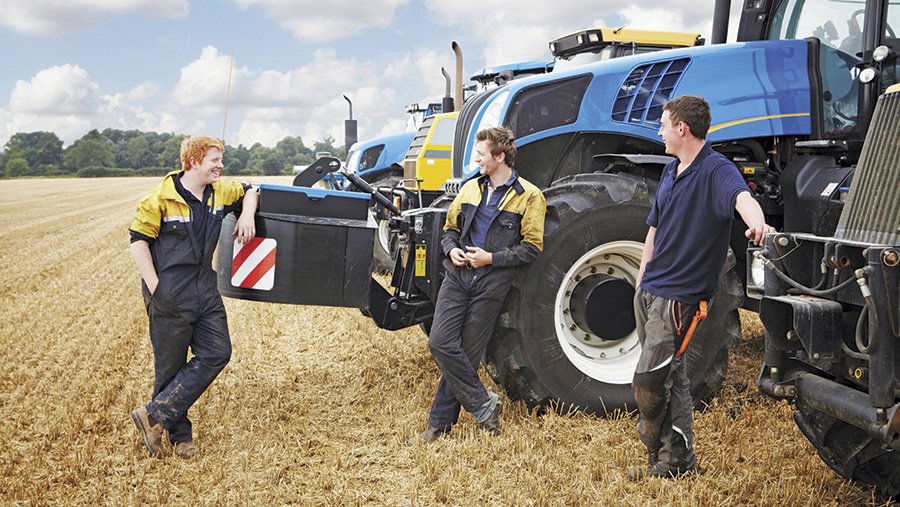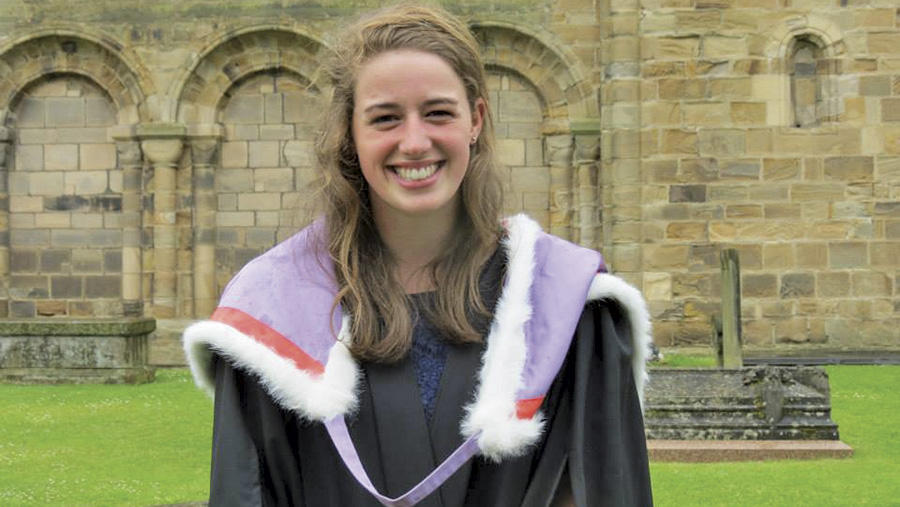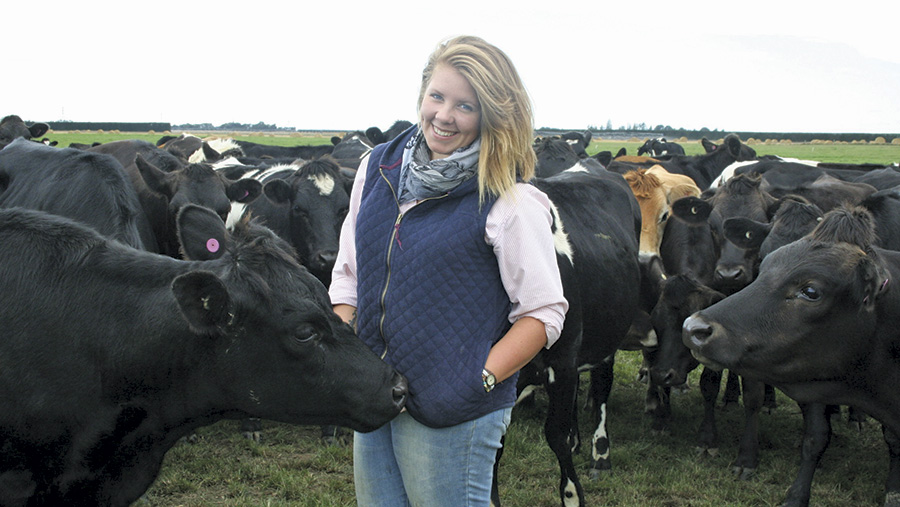How to find help to fund agricultural career development
 © Cultura/Rex/Shutterstock-
© Cultura/Rex/Shutterstock- Agriculture may be the fastest growing subject at UK universities, but studying is expensive, with most universities charging tuition fees of £9,000/year – and then there are living expenses to be covered, too.
Even where it is possible to work part time to help with costs, fees are high enough to preclude some who may wish to develop a career in agriculture from embarking on a course of study.
Others may want to develop their skills without committing to full-time study.
Undergraduate support
The good news for prospective students is that a range of bursaries and scholarships can offer useful assistance.
Some of the bursaries are offered by individual universities and colleges, some by industry partners and many by show societies who want to support local young people.
See also:
For example, in 2016 Kent Agricultural Show Society introduced a scholarship that pays three students from the area £1,000 for each year of their course.
Students can use the scholarship for any reasonable costs connected with going to college or university, including tuition fees, accommodation costs, living expenses, or equipment to help them study.
Meanwhile, the Studley College Trust offers up to £2,000 a student in any one academic year for students of agriculture, horticulture or related land-based subjects who would otherwise be unable to undertake or continue with their training (see case studies below).
Postgraduate support
At postgraduate level, NFU Mutual offers bursaries of up to 75% of course fees for selected students.
The award is generally open to students who have gained or are expected to gain a 2:1 or above in agriculture or a closely-related degree, and have been accepted on a Masters or PhD course in agriculture within the UK.
Cranfield School of Management’s Master of Business Administration (MBA) has a variety of scholarships.
Development while working
Professional career development while working is becoming increasingly important in farming and there are opportunities in this area too.
In Scotland, SAC Consulting delivers the Scottish Enterprise Rural Leadership Programme, which helps farmers, rural business managers and employees looking to develop leadership skills and grow their business.
About 45 places are offered each year with participants completing 13 days of activities typically spread between October and March.
The popular scheme has been running for longer than a decade with more than 400 people having taken part.
There is a charge of £820 plus VAT but the remainder of the costs of running the programme are picked up by Scottish Enterprise.
The Farm Management Development Programme, introduced in 2015, is another where scholars must make a contribution themselves – paying about £1,900. But this is half of what it would cost without the extra funding that is offered to applicants.
It is aimed at helping develop young people in management-type positions in farming or a rural business and involves attending two week-long, residential programmes at Bishop Burton College in East Yorkshire.
Topics covered include how to prepare a whole farm budget, the analysis of farm accounts, people management, motivation, leadership and leadership styles, understanding costs of production and benchmarking.
The course is accredited by the Royal Agricultural University, Cirencester.
Travel bursaries
There is a long history in the farming industry of learning through travel, with farmers visiting their counterparts overseas to study new or alternative techniques.
The best known of the travel scholarships is the Nuffield Farming Scholarship Scheme, which offers successful candidates up to £7,000 to travel and study a chosen field or topic.
Scholars are expected to write a report and make a presentation at the annual conference describing the conclusions reached, with recommendations to the industry.
Unusual bursary
The Royal Geographical Society offers one of the most unusual bursaries, with beneficiaries winning the use of a Land Rover for 12 months.
The Land Rover Bursary Scheme awards up to five inspiring young people aged 21-35 the use of a Land Rover Discovery Sport for a year to support the development of their countryside careers.
Recipients in 2016 included a 21-year-old shepherd from Devon who is developing his own wool business and a farmer from Norfolk who manages 300 dairy cows, alongside her own Dexter beef herd.
A pedigree sheep breeder from Wales was also among last year’s winners.
Further information
Visit the following websites to get details of the 2017-18 application process.
- Nuffield Scholarships: www.nuffieldscholar.org
- Richard Wigram Scholarship: www.richwigramnzscholarship.org
- NFU Centenary Award: www.nfumutual.co.uk
- Studley College Trust: www.studleytrust.co.uk
- Kent County Agricultural Society Scholarship: www.kentshowground.co.uk/scholarship-scheme
- Farm Management Development Programme: www.bishopburton.ac.uk
- Scottish Enterprise Rural Leadership Scheme: www.scottish-enterprise.com
- Cranfield MBA Programmes: www.cranfield.ac.uk
Case studies
Annabel Hamilton, 25, Studley College Trust

Annabel Hamilton
What’s your farming background
I was brought up on a mixed family farm in the Scottish Borders where I began with helping out at harvest and during the school holidays.
What did you study and what help did you get?
I did a one-year Graduate Diploma in Agriculture at the Royal Agricultural University, Cirencester. I applied to the trust as I required some additional funding to help pay for my tuition.
How did you find the application process?
The application was straightforward and quick to complete. The questions asked were concise and focused on the reasons why I wanted to study agriculture, after studying geology for the three previous years.
What were you awarded?
I received £2,000, which was divided into three termly instalments. This went towards my tuition fees.
How helpful was this?
It significantly reduced the financial pressure of paying for the course. I did not want to receive a loan and wanted to raise the funds myself, which I can safely say that I did. If the time is put into researching trusts and scholarships, it is possible to raise a considerable amount of money to help pay for further education.
What are you doing now?
I am arable manager for Patrick Dean in Lincolnshire. I am involved with 1,092ha of crops including 243ha of potatoes and 137ha of beet.
Zoe Jackson, 23, Richard Wigram New Zealand farming scholarship

Zoe Jackson
How did you find out about the scholarship?
Via the Mole Valley Farmers newsletter in November 2013.
The closing date was two days away, so I applied as quickly as I could, knowing the worst-case scenario was I wouldn’t be offered it.
What did the application process involve?
Every applicant was asked to provide information on employment/studies, skills that relate to the scholarship and what they would gain from it.
After this paper assessment, selected applicants were interviewed.
I was encouraged to ask questions throughout the interview, and a week later, received the call with my acceptance on to the programme.
What exactly did you win?
The scholarship, set up in memory of Rich Wigram, simply aims to encourage young people, with a passion for dairy farming to try out the style of farming among New Zealand producers.
I won return flights to New Zealand from England as well as support to find a suitable place of work with guidelines for applying for visas and if/when needed a mentor should any problems have occurred.
How did you find it?
I arrived in New Zealand in June 2014 on a farm in mid Canterbury, south island.
The farm I was going to work on was on the opposite end of the scale from what I had worked on in England.
It was a 1,400 dairy cow farm, with a 70 bail rotary parlour and 12 members of staff.
Two and a half years later I’m still here in New Zealand.
I am farm manager of Emilius, part of the Align Farm Group in mid-Canterbury. I am working my way towards an NZ agriculture qualification with the hope of working up to business manager of a farm in a year or so.
Would you recommend it?
I think if you’re considering doing some work in New Zealand you should definitely go for it.
It’s taught me so much about myself, as well as the industry over here and it’s opened up avenues that were previously not accessible in England.
Without this opportunity, I would not be doing what I love in this beautiful country.
